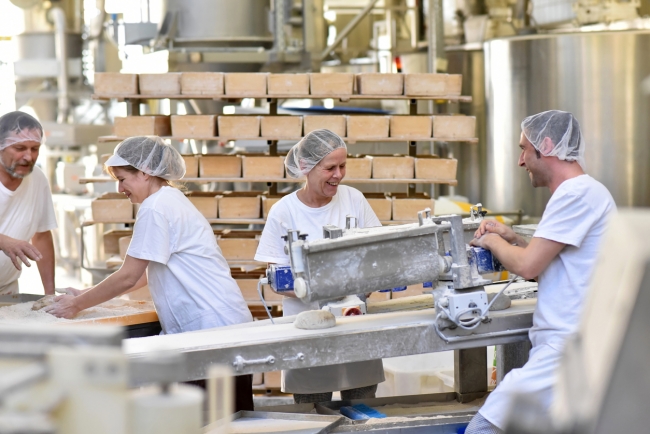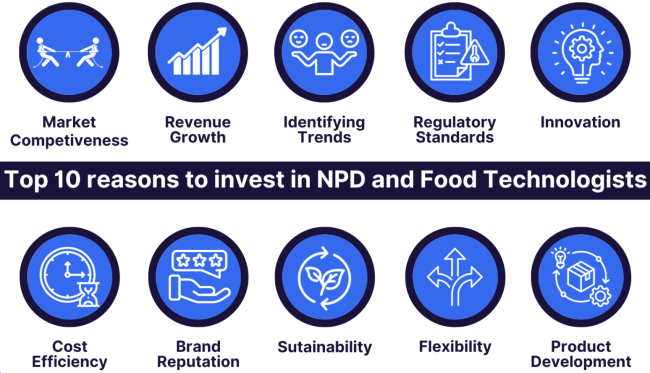3 minute read • published in partnership with CQM Training & Consultancy
Insight: Why food and drink manufacturers should focus on NPD and food technology investment
CQM Training & Consultancy shares its top ten reasons why it’s so important that food and drink manufacturers invest in new product development and food technology.
Simply put, food, drink, and/or feed manufacturers must invest in new product development (NPD) and food technologists to remain competitive. This investment is necessary to meet demanding consumer expectations, comply with regulations, and ultimately drive business growth. These strategic investments not only address current market needs but also position organisations for long-term success in an ever-evolving industry.
1 – Market Competition
The food industry is highly competitive, and consumer preferences and trends are constantly changing. NPD allows food manufacturers to stay relevant by introducing innovative products that meet changing consumer demands. This helps food manufacturers distinguish themselves and gain a competitive edge in the market.
2 – Revenue Growth
Introducing new and appealing products can drive significant sales growth. NPD helps manufacturers follow trends, reach new customers, and grow their product range, leading to increased revenue.
3 – Staying on top of Preferences and Trends
Food Technologists play a key role in understanding consumer preferences and market trends. Manufacturers rely on their knowledge to create products that align with health trends, dietary preferences, and consumer demands. This helps them keep their offerings appealing and popular.

Food and drink manufacturers must invest in new product development and food technologists to remain competitive / Picture: Getty/iStock
4 – Meeting Regulatory Standards
Food Technologists are well-versed in food safety regulations and quality standards such as HACCP and VACCP. Developing experts helps meet regulations, lowers legal risks, and improves the company’s reputation for safe and high-quality food.
5 – Innovation and Differentiation
NPD fosters innovation within the company. Food Technologists contribute to the development of unique recipes, formulations, and production processes, allowing manufacturers to distinguish their products from competitors. Innovation can also lead to the creation of revolutionary or patented technologies, further securing a competitive advantage.
6 – Adapting to Changing Consumer Lifestyles
As consumer lifestyles frequently change, so do their food preferences. Food Technologists can flexibly create products for different diets, convenience, and lifestyles, like plant-based or functional foods.
7 – Cost Efficiency and Process Optimisation
Food Technologists can optimise production processes, improve efficiency, and reduce costs associated with manufacturing using methodologies such as lean six sigma. This is essential for maintaining profitability, especially when introducing new products that may require adjustments to existing production methods.

Graphic: CQM Training & Consultancy
8 – Brand Reputation
Successful NPD and the presence of qualified Food Technologists contribute to a positive brand image. People trust and buy from companies that are known for being innovative, produce high-quality products, and that prioritise safety. This reputation can be a valuable asset in building brand loyalty and repeat purchases.
9 – Sustainability Initiatives
With increasing consumer awareness about environmental issues, sustainability has become a critical consideration in product development. Food Technologists can help incorporate sustainable practices into NPD, such as sourcing eco-friendly ingredients, reducing waste, and adopting “greener” environmentally conscious production methods.
10 – Existing Product Development
Remember that optimising existing product portfolios is just as important to maintaining consistent customer value too. Using tools like DMAIC in lean six sigma helps improve processes, increasing efficiency and effectiveness.
Summary
Food and drink manufacturers understand the significance of investing in their key staff to support NPD, such as food technologists. However, they often struggle to determine the most effective approach to do so.
One opportunity for food and drink manufacturers to consider is to train and upskill their Food Technologists, empowering them to maximise and realise NPD potential. There are number of training programmes out there, but a fully funded apprenticeship programme, such as the Food Technologist L3 could be a fantastic option to think about. This programme includes a Level 3 Diploma in Food Tech, encompassing all of the above for organisations to realise the true benefits and value of NPD and their Food Technologist abilities.
